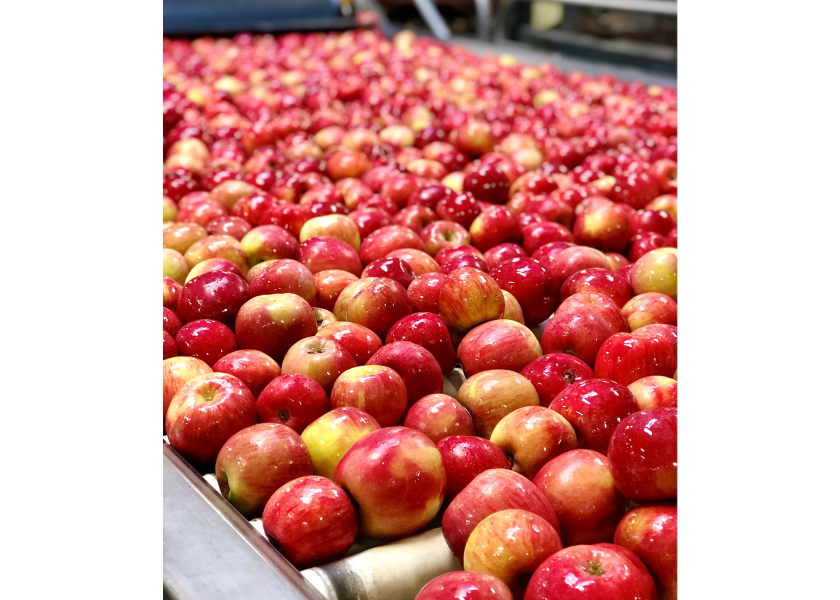Washington apple crop downsized by 5% in November estimate

With most of the 2021 apple crop now harvested and in storage, Washington apple shippers have lowered their estimate of the state’s fresh apple volume by 5.3% compared with an earlier estimate, according to the Washington State Tree Fruit Association.
While the August forecast put the Washington state fresh apple volume at 124.85 million 40-pound cartons, the Nov. 9 estimate shrinks the crop to 118.26 million cartons, according to a news release. “Apple harvest is still wrapping-up for some Washington varieties but based on volumes harvested so far our members are expecting a decrease to 118.26 million boxes,” Jon DeVaney, president of the Washington State Tree Fruit Association, said in the release. “Our members are reporting smaller crops of some varieties including Honeycrisp, galas, and red delicious. High heat earlier in the season affected what was ultimately picked in some cases. The organic crop is still projected to be over 15 million boxes. In spite of the smaller harvest, we are seeing high-quality fruit and consumers can expect delicious Washington apples throughout 2022.”
The 2020 Washington fresh apple crop totaled 122 million cartons, while the 2019 Washington apple crop was 135 million cartons.
The November report, according to the release, is based on a survey of association members, and represents fruit picked through Oct. 31 and the best estimate of what is still to be harvested.
The estimate represents the harvested total volume of apples that will eventually be packed and sold on the fresh market, and excluding product sent to processor.
Industry reaction
The industry’s November crop estimate is typically reliable, said Don Roper, vice president of Honeybear Marketing LLC. He said the November estimate typically varies just 3% or 4% compared with the eventual packout when the season ends in August.
Even so, Roper said the 118.26 million cartons estimate for the 2021 may be optimistic.
This year, Washington state’s apple growing season was one of the most difficult ever for growers, punctuated by record-setting hot temperatures; one day in June topped 115 degrees.
The central Washington apple-growing region experienced 16 days over 100 degrees Fahrenheit, and at least three days above 109 degrees, Lee Kalcsits, associate professor of fruit physiology with Washington State University and extension researcher at the WSU Tree Fruit Research and Extension Center, said in early August.
The effect of the heat was variable, depending on variety, Roper said. Washington apple shippers and packers have excellent technology that prevents damaged fruit from reaching the consumers, and shippers will be closely watching quality of controlled atmosphere fruit marketed next year.
Some Washington apple varieties will show a healthy volume increase, others will be flat and while the most heat-vulnerable varieties will lose substantial volume compared with a year ago, he said.
Washington’s apple crop comprises 70% to 80% of the U.S. fresh apple supply, Roper said.
Galas hit
The hot weather brought down gala production in Washington state by about 12% compared with a year ago, Roper said. Both galas and Honeycrisp apples, picked earlier in the season, were most vulnerable to the heat, he said.
Even with new plantings maturing, Honeycrisp volume in Washington state is down about 3% this year, Roper said.
Varieties that experienced greater volume include granny smith and Pink Lady apples, both projected to be up about 25%. Fuji apple volume in Washington state could be down about 7%, he said.
Washington Cosmic Crisp apple variety volume for 2021-22 is projected at 3.6 million cartons, up from about 1.5 million cartons in 2020-21.
For the 2022 Washington crop, Roper said Cosmic Crisp output is projected at near 7 million cartons.
With Washington gala volume down, Roper said there will be more opportunities to promote Cosmic Crisp and other premium niche varieties.
“If you have a supply of good premium apple varieties or a new apple variety, it’s going to get an opportunity to help deliver sales and margin to retailers,” he said.
In general, Washington apple fruit sizing is off one size to one and one-half sizes compared with a year ago. “Every time (the crop) goes down a size, you can reduce the overall crop by 12% overall,” he said.
With East and Midwest production of Honeycrisp down an estimated 15% to 25%, Eastern retailers will transition earlier in the 2021-22 season from Eastern apple shippers to Washington suppliers.
That Honeycrisp shortage in the East will put upward pressure on prices. Roper said that one worry for the season is that higher-priced apples could lose some market share at retail to competitive fruit such as grapes or citrus.
Another possibility is a “much bigger” apple import programs may come into play next summer, Roper said.
--30--







